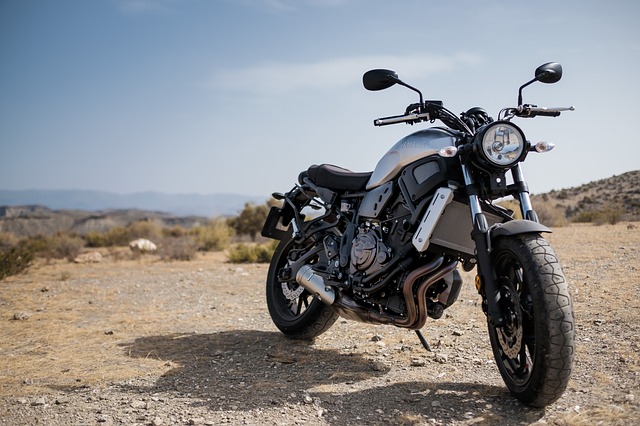Motorcycles are more like cars; motorbikes need more of servicing and maintenance to keep them in good shape, and to stay longer on the road too. There are a number of parts of the motorcycle which you can always keep an eye on to keep your bike at its best.
Maintaining the brake pads of your motorbike is very important because your life may depend on their proper functioning. It is recommended to get a check-up every 10,000 or 15,000km depending on your city and how you drive. In cities with a lot of hills you should perform a check every 10,000km.
 Monitoring the tires is part of the basic care of your bike. It is advisable to always do this before beginning a journey, making sure that they do not have cracks, holes, tears or any wear that can put your safety at risk. Once the tires are worn, don’t wait too long to change them.
Monitoring the tires is part of the basic care of your bike. It is advisable to always do this before beginning a journey, making sure that they do not have cracks, holes, tears or any wear that can put your safety at risk. Once the tires are worn, don’t wait too long to change them.
At least every 10,000km you should also clean the air filter of your motorcycle. This filter prevents dirt from entering the engine of your bike. If you live in an area you are driving through streets with a lot of dust or dirt, you should clean the air filter as often as every week.
If you have a new bike and you follow the instruction manual, it should last for a long time in good condition. Do not forget to take your motorbike to the mechanic one a year and to drive carefully and always go to the mechanic if you notice that your motorbike has any issues or makes unusual noises.
Sourced From: http://motor.onehowto.com/article/10-motorcycle-maintenance-tips-to-keep-your-motorbike-healthy-5422.html
Motorcycle maintenance is almost the same as vehicles. The best thing about motorcycles is that their maintenance is quite easier, and can be done on DIY way better than the vehicles. So if you have a motorcycle, you can avoid giving that extra cash to the mechanic, you may attend to your motorcycle yourself.
TYRES – Pressures
When was the last time you checked your bike’s tyre pressures? It should be done on a weekly basis, but many of us forget to keep an eye on one of the most vital parts of our bike’s set-up.
Underinflated tyres tend to affect handling and braking as the lack of pressure means the tyre wall isn’t firm enough to properly cope with the forces exerted on it. Over inflation can also result in deterioration in handling, as well as a reduced contact patch with the road. This can result in a lack of grip under braking.
INCORRECT chain tension can result in premature sprocket and gearbox wear, unsmooth gearshifts, snatchy transmission, hamper your bike’s rear suspension travel and reduce the life of your bike’s drivechain.
Check your workshop manual for how to adjust your bike’s chain to the correct tension. Remember to set the tension with some load on the bike (preferably with someone on it) as the chain will tighten up once a rider’s on board.
CHANGING YOUR bike’s oil and filter isn’t a great deal more difficult than refreshing the coolant system; all you need are the right tools, decent oil and the correct filter.
Sourced From: http://www.visordown.com/features/motorcycle-top-10s/oil-and-filter-change
Cycling is fun when you have a good motorbike for the ride. However, riding can also lead to fatigue due to a number of factors, which is not just a bad experience to have on the road, but a one that poses great risk to the rider and other road users. Avoid fatigue on the road as much as you can.
PLAN: Don’t just plan your route; plan your stops as well. Don’t make unrealistic distance goals. Also, be aware that some riders within your group may not have the same stamina as the others, so allocate stops to cater for the most vulnerable rider.
SLEEP: Before the ride, make sure you get adequate sleep the night before. If it’s a ride over several days, suggest to your fellow riders that they turn in at a reasonable hour rather than staying up drinking into the early hours of the morning. It will not only affect their safety, but also yours. And set a realistic departure time in the morning. Not too early.
DRINK: Drink plenty of water. It will prevent you becoming dehydrated from exposure to the wind. Dehydration can lead to dizziness, confusion and slower body motor skills. But avoid sugar drinks, caffeine and alcohol, which may “give you wings” to begin with, but will ultimately lead to sleepiness. Drink alcohol in moderate amounts at overnight stops as it will disturb the quality of your sleep, leaving you tired the next day.
EAT: Eat smaller, more frequent meals and avoid carbohydrate-heavy foods. Big meals and foods high in carbohydrate, fat and sugar slow your body down while it concentrates on digesting the food.
Sourced From: http://motorbikewriter.com/10-tips-beating-rider-fatigue/